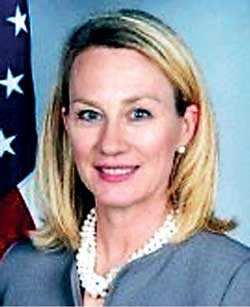Monday Mar 02, 2026
Monday Mar 02, 2026
Wednesday, 13 November 2019 01:37 - - {{hitsCtrl.values.hits}}
By Madushka Balasuriya reporting
from Bangkok
Transparency, predictability, clarity in terms of infrastructure planning, and an open regulatory environment, were some of the key areas highlighted by a top US government official earlier this week, when discussing potential US private sector investment in the Indo-Pacific region.
Meanwhile, in a more specific reference to Sri Lanka and the country’s upcoming Presidential Elections, there was also a warning against a return to “Government policies that were deeply detrimental to Sri Lanka’s economic wellbeing”.
“We certainly look to Sri Lankans to select their leaders, and will respect their decision with the vote and the outcome of any election in Sri Lanka, but then a Government will be judged by its performance and its record. Clearly in years past we saw Government policies that were deeply detrimental to Sri Lanka’s economic wellbeing,” stated US Department of State Acting Assistant Secretary for South and Central Asian Affairs Alice Wells.
Wells was speaking at a media roundtable on the sidelines of the Indo-Pacific Business Forum (IPBF), held in Bangkok, Thailand on 4 November. The forum itself was held alongside the ASEAN Summit, also in Bangkok.
 |
 |
| US Agency for International Development Deputy Administrator Bonnie Glick | US Department of State Acting Assistant Secretary for South and Central Asian Affairs Alice Wells |
“With respect to any Government that emerges out of the elections, we and private sector firms will be looking to see what tone they set, the policies that they pursue, and the commitments that they give to implement economic reforms, and improve the ease of doing business,” she added.
“What they’re looking for is transparency, predictability, understanding the Government’s long-term plans with regard to infrastructure, and I think one of the key advantages of a US private sector investment is that as citizens of a country you know that it doesn’t come through corrupt mechanisms or means.”
Wells proceeded to name-check the Hambantota Port as the “most famous example” of projects undertaken in the region that have proved to be a “constant burden with respect to the external debt” of a country. However, she was keen to point out that this was not a call to ignore Chinese investment, rather for countries like Sri Lanka to create a more competitive and inclusive regulatory environment.
“We’re not asking for countries to choose between the US and any other country, what we’re asking for is to create an environment where there can be a competition that provides your country with high quality options for infrastructure development.”
China has long been accused of debt-trap diplomacy, where they are charged with miring developing countries in unsustainable debt-based relations. Going back to the example of the Hambantota Port, it was this project which many now use as a key point of reference as to what can happen when a country finances infrastructure projects with unsustainable loans from China.
After former President Mahinda Rajapaksa enlisted China’s Export Import Bank in financing the port, the Government encountered debt-repayment issues soon after its completion, which was eventually alleviated through a debt-for-equity swap, giving a State-owned Chinese firm a majority stake in the port from 2017.
However, despite the fate of the Hambantota Port, it would be disingenuous to say that China’s lending in the region is geared towards entrapping nations in unsustainable debt. According to a new report by The Lowy Institute titled, ‘Ocean of Debt?’: “The evidence suggests that, if left alone, Chinese state firms will cut corners and inflate prices. If managed properly, they can deliver good quality infrastructure.”
This ties in with the US government’s desire to have private companies from the US be given a fairer shake, in terms of financing projects in the region. Indeed, the Indo-Pacific Business Forum can be seen as an all-round US government effort to unlock private sector-led growth in a region believed to be vital to the US’s economic health, as well as the world’s economic health.
“The goal is to highlight the benefit of partnering with a dynamic US private sector and the critical role of market-based economic systems, private sector finance and open investment environments in driving the regions success,” explained Wells.
This is the second year in which the IPBF is being held, and in the year since its inauguration, the US Agency for International Development (USAID) has dedicated an additional $ 441 million toward energy, infrastructure, digital connectivity, and trade activities in the Indo-Pacific region alone.
The investment has been a welcome one for the region, as it addresses the glaring need for infrastructure - not just to boost economic growth in a country, but to boost trade within the region as a whole.
For USAID Deputy Administrator Bonnie Glick, who also spoke to media at a roundtable discussion on Monday, while acknowledging the need for infrastructure, countries also need to be cognisant and wary of “plug-and-play” solutions.
“When we talk about deals that are done in a very rapid closed door non-transparent manner, with countries that are not democratically aligned, and that are often authoritarian, we’re looking at deals that the US government would question and that US industry would look at say: ‘this doesn’t seem to be a level playing field’. If there’s an international option that is available and not considered, it’s a disservice to the citizens of those countries,” stated Glick.
“It’s hard to say no to a ‘plug-and-play’ solution that makes everything seem very easy. But when such a solution involves giving up aspects of national sovereignty, territorial sovereignty, or cybersecurity for your own population, those are considerations national leaders really should look at very seriously before committing to an OBOR solution.
“There are so many companies that offer those options. It’s really important that as countries look at OBOR, they look at it as ‘an’ option not ‘the’ option.”